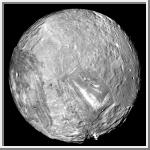|
COMETS EARTH JUPITER KUIPER BELT MARS MERCURY METEORITES NEPTUNE OORT CLOUD PLUTO SATURN SOLAR SYSTEM SPACE SUN URANUS VENUS ORDER PRINTS
PHOTO CATEGORIES SCIENCEVIEWS AMERICAN INDIAN AMPHIBIANS BIRDS BUGS FINE ART FOSSILS THE ISLANDS HISTORICAL PHOTOS MAMMALS OTHER PARKS PLANTS RELIGIOUS REPTILES SCIENCEVIEWS PRINTS
|
Related Document
Download Options
This image is an orthographic image of Miranda centered at the south pole. Zero degrees logitude, which is the central longitude of the side facing Uranus, is at the bottom. The image was computer-assembled from images obtained January 24, 1986, by the Voyager 2 spacecraft. Miranda is the innermost and smallest of the five major Uranian satellites, just 480 kilometers (about 300 miles) in diameter. This image is a full-disc, south-polar view of the moon showing the varying geologic provinces of Miranda. The moon's surface consists of two major strikingly different types of terrain. One is an old, heavily cratered, rolling terrain with relatively uniform albedo, or reflectivity. The other is a young, complex terrain characterized by sets of bright and dark bands, scarps and ridges. These are features found in the ovoid regions at right and left and in the distinctive chevron feature below and right of center. (Courtesy A.Tayfun Oner) This image is Copyright © 1997 by A. Tayfun Oner. Any commercial/for-profit use of this image needs to be addressed to Calvin J. Hamilton. |
